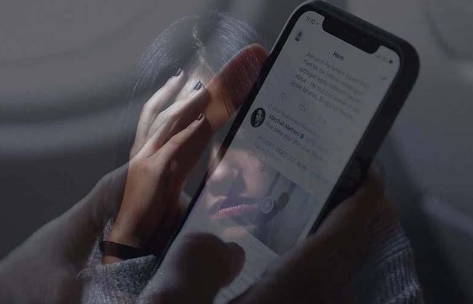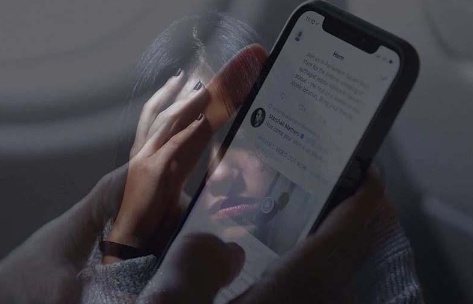Anxiety and Depression are On the Rise. Is Social Media to Blame?

From 2005 to 2017, major depression rose by 52% among teenagers.
This trend – which is most pronounced in girls born after 1995 [1] – is starkly absent in older adults.
Source: Monitoring the Future: A Continuing Study of American Youth (12th-Grade Survey), 2017 [2]
What’s the explanation?
Complex problems rarely have simple explanations. Often multiple things are at play. One factor could be that reduced mental health stigma makes people more willing to speak out and seek help. However, the rise in behaviors such as suicides [3] and self-harm hospital admissions refute this idea.
Economic distress – another plausible explanation – doesn’t fully answer the question either. There is no correlation between the rise in mood disorders when compared with the ups and downs of the economic cycles since the mid 2000s.
Can we blame environmental concerns, or stress about COVID-19? Not convincingly. Climate concerns were present well before 2012, and the pandemic emerged well afterward.
Experts believe the mental health crisis might hinge on something else that happened around 2012: the widespread adoption of the smartphone and social media.
When scientists began investigating the link between smartphones and mental health, they found clear associations between high usage and poor mental health [4, 5]. The relationship seemed dose-dependent; heavy users (~5 hours per day) were twice as likely to attempt suicide [6].
Are smartphones, or particular apps on smartphones, causing depression? Or is depression causing people turn to their smartphones?
To answer this question, researchers at the University of Pennsylvania recruited 148 undergraduate students. They restricted half to ten minutes of daily social media, with the other half being allowed to use social media as much as they like. Over three weeks, depression dropped significantly in the abstinence group, with the positive outcome highest in people who started out most depressed [7]. Feelings of loneliness decreased in this group as well. Apps like Facebook and Instagram, which were designed to connect us, actually make us lonelier.
Why are these apps so negative for mental health? Research directly comparing different types of Facebook use helps us answer this question. In one study, people either spent 20 minutes messaging with friends, updating their profiles, or passively browsing others’ posts. The results showed that passive scrolling on Facebook produced the worst effects on mood [8]. Why would this be?
Social comparison and body image likely play a role [9]. These apps amplify unrealistic social expectations which make us feel inadequate. In girls, who are judged more harshly on their bodies, this effect is accentuated.
There are many side-effects of heavy social media use which might mediate decreases in mental health. Sleep deprivation and reduced attentional abilities, for example, are common consequences of heavy usage [10].
The evidence is clear: social media is a primary driver of the recent mental health crisis in teens. If you’re interested in learning more, I recommend Jean Twenge’s book, iGen. Social media is an experiment that many of us agreed to enter without much thought. Now is the time to conduct your own experiment – take a social media holiday and see how you feel.
Learn More About The Wellness Company
References
[1] Twenge, J. M., Cooper, A. B., Joiner, T. E., Duffy, M. E., & Binau, S. G. (2019). Age, period, and cohort trends in mood disorder indicators and suicide-related outcomes in a nationally representative dataset, 2005–2017. Journal of abnormal psychology, 128(3), 185.
[2] Miech, Richard A., Johnston, Lloyd D., Bachman, Jerald G., O’Malley, Patrick M., and Schulenberg, John E. Monitoring the Future: A Continuing Study of American Youth (12th-Grade Survey), 2017. Inter-university Consortium for Political and Social Research [distributor], 2018-10-29. https://doi.org/10.3886/ICPSR37182.v1
[3] Miron, O., Yu, K. H., Wilf-Miron, R., & Kohane, I. S. (2019). Suicide rates among adolescents and young adults in the United States, 2000-2017. Jama, 321(23), 2362-2364.
[4] Twenge, J. M., Joiner, T. E., Rogers, M. L., & Martin, G. N. (2018). Increases in depressive symptoms, suicide-related outcomes, and suicide rates among US adolescents after 2010 and links to increased new media screen time. Clinical Psychological Science, 6(1), 3-17.
Przybylski, A. K., & Weinstein, N. (2017). A large-scale test of the goldilocks hypothesis: quantifying the relations between digital-screen use and the mental well-being of adolescents. Psychological science, 28(2), 204-215.
Twenge, J. M., & Campbell, W. K. (2019). Media use is linked to lower psychological well-being: Evidence from three datasets. Psychiatric Quarterly, 90(2), 311-331.
Hunt, M. G., Marx, R., Lipson, C., & Young, J. (2018). No more FOMO: Limiting social media decreases loneliness and depression. Journal of Social and Clinical Psychology, 37(10), 751-768.
[8] Yuen, E. K., Koterba, E. A., Stasio, M. J., Patrick, R. B., Gangi, C., Ash, P., … & Mansour, B. (2019). The effects of Facebook on mood in emerging adults. Psychology of Popular Media Culture, 8(3), 198.
[9] Engeln, R., Loach, R., Imundo, M. N., & Zola, A. (2020). Compared to Facebook, Instagram use causes more appearance comparison and lower body satisfaction in college women. Body Image, 34, 38-45.
[10] Abi-Jaoude, E., Naylor, K. T., & Pignatiello, A. (2020). Smartphones, social media use and youth mental health. Cmaj, 192(6), E136-E141.





While social media related stress may be a significant contributing factor a more likely original, now transgenerational, cause is a still medically unrecognized epidemic of chronic near-subclinical-non-IgE-mediated food allergy related calcium deficiency. Triggered by the 1980 FDA approval of the expanded use of added ‘cultured-free’ MSG as an alleged “flavor enhancer,” my own allergy related serious calcium deficiency went undiagnosed for three decades. Mostly, mainstream medicine still fails to recognize and research my (Dr. Arthur F. Coca’s) kind of food allergy reactions as true allergies. As recalled I tried to inform The Wellness Company of some of these things a while back, albeit, in-vain. I can agree with their mission but their reliance on allergy, FDA approved food poisoning and too-common medical error ignorant and incompetent so-called “experts” is probably mysteriously, seriously diluting their best efforts, unnecessarily. Now recovering from a similarly caused very serious phosphorus deficiency, I’m again free of any prescription medications, at age 79.
I wonder how much of this could be the result of electro-magnetic radiation from the cell phones.